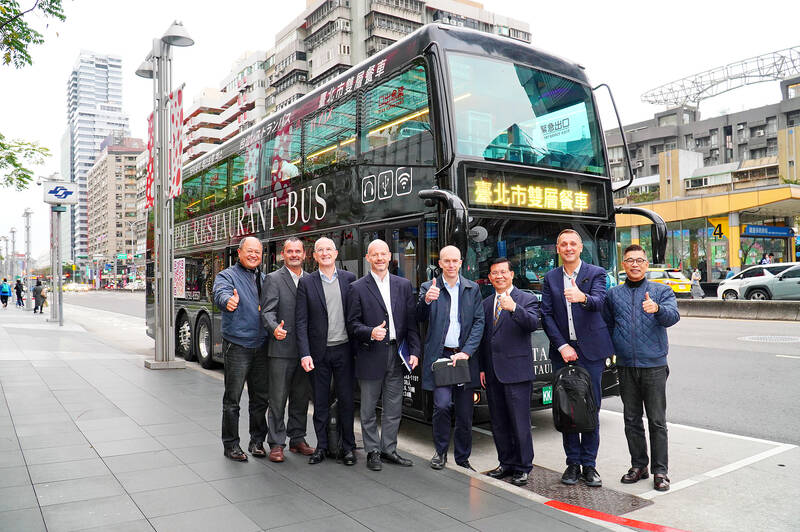Taiwan’s tourism sector is expected to embrace a gradual recovery this year before next year returning to the levels seen before the COVID-19 pandemic, as the government is prepared to further relax travel curbs and mask rules as COVID-19 infection numbers drop.
The rebound in travel was first evidenced in the high booking rate at local hotels during the 10-day Lunar New Year holiday, as domestic travel surged, the Tourism Bureau said.
The indoor mask mandate is to be scrapped on Monday next week, except in medical facilities and nursing homes, on public transportation and at other designated locations, as the COVID-19 situation is stabilizing, the Central Epidemic Command Center has announced.

The relaxation in mask rules is the latest step by the government to revive the economy, and follows the reopening of the country’s borders in October last year.
The Tourism Bureau expects the number of foreign visitors in Taiwan to climb to about 60 million this year, about half the number recorded before the coronavirus became widespread, taking a toll on the nation’s tourism sector.
Next year is poised to experience a full revival, as the bureau expects the number of foreign visitors to rise to the level recorded before the pandemic, hitting 11.86 million.
The forecast has cheered the nation’s tourism sector, with airlines, travel agencies, hotel operators and vehicle renting operators gearing up for the return of tourists.
As people are keen to hit the road again after three years of near paralysis, domestic travel is also becoming trendy, with people planning longer vacations at multiple domestic destinations. To cater to all travelers’ tastes, new flight routes, and innovative or high-end itineraries and services have been launched.
Embracing the luxury travel trend during the post-pandemic period, E-go Taiwan Car Rental & Travel Group Corp is offering a luxury for travelers who want to enjoy sightseeing in Taipei that has never been seen in Taiwan before.
E-go is collaborating with the Tourism Bureau in rolling out a double-decker dining bus tour, which allows passengers to enjoy exquisite dining experiences on the go.
Volvo Bus Corp, which makes the luxury tour buses adopted by E-go, sent five high-ranking executives to Taiwan to get a better understanding of the recovery in tourism here. Five executives from the Swedish company — Mattias Rångeby, Mats Nilsson, Dusan Prastalo, Emmanuel Jupet and Scott Harvey — yesterday visited Taiwan and experienced the special sightseeing tour on the bus.
The double-decker dining coach adopted by E-go for the Taipei tour, dubbed Volvo B11R, is a premium coach and environmentally friendly. The highly fuel-efficient right-sized D11 engine helps to cut operational costs, while Volvo’s high quality ensures superior functionality, passenger comfort and lifecycle productivity.

The US dollar was trading at NT$29.7 at 10am today on the Taipei Foreign Exchange, as the New Taiwan dollar gained NT$1.364 from the previous close last week. The NT dollar continued to rise today, after surging 3.07 percent on Friday. After opening at NT$30.91, the NT dollar gained more than NT$1 in just 15 minutes, briefly passing the NT$30 mark. Before the US Department of the Treasury's semi-annual currency report came out, expectations that the NT dollar would keep rising were already building. The NT dollar on Friday closed at NT$31.064, up by NT$0.953 — a 3.07 percent single-day gain. Today,

‘SHORT TERM’: The local currency would likely remain strong in the near term, driven by anticipated US trade pressure, capital inflows and expectations of a US Fed rate cut The US dollar is expected to fall below NT$30 in the near term, as traders anticipate increased pressure from Washington for Taiwan to allow the New Taiwan dollar to appreciate, Cathay United Bank (國泰世華銀行) chief economist Lin Chi-chao (林啟超) said. Following a sharp drop in the greenback against the NT dollar on Friday, Lin told the Central News Agency that the local currency is likely to remain strong in the short term, driven in part by market psychology surrounding anticipated US policy pressure. On Friday, the US dollar fell NT$0.953, or 3.07 percent, closing at NT$31.064 — its lowest level since Jan.

The New Taiwan dollar and Taiwanese stocks surged on signs that trade tensions between the world’s top two economies might start easing and as US tech earnings boosted the outlook of the nation’s semiconductor exports. The NT dollar strengthened as much as 3.8 percent versus the US dollar to 30.815, the biggest intraday gain since January 2011, closing at NT$31.064. The benchmark TAIEX jumped 2.73 percent to outperform the region’s equity gauges. Outlook for global trade improved after China said it is assessing possible trade talks with the US, providing a boost for the nation’s currency and shares. As the NT dollar

PRESSURE EXPECTED: The appreciation of the NT dollar reflected expectations that Washington would press Taiwan to boost its currency against the US dollar, dealers said Taiwan’s export-oriented semiconductor and auto part manufacturers are expecting their margins to be affected by large foreign exchange losses as the New Taiwan dollar continued to appreciate sharply against the US dollar yesterday. Among major semiconductor manufacturers, ASE Technology Holding Co (日月光), the world’s largest integrated circuit (IC) packaging and testing services provider, said that whenever the NT dollar rises NT$1 against the greenback, its gross margin is cut by about 1.5 percent. The NT dollar traded as strong as NT$29.59 per US dollar before trimming gains to close NT$0.919, or 2.96 percent, higher at NT$30.145 yesterday in Taipei trading